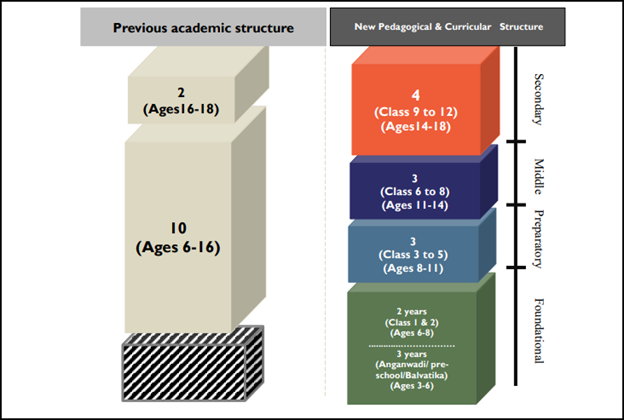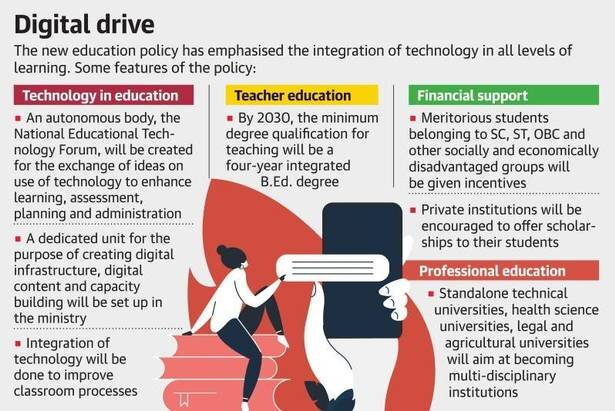New National Education Policy 2020 Highlights – All You Need to Know!!

A brand-new education policy has been issued and approved by the Union Ministry of Education, earlier known as Human Resource Development Ministry, and proposed a new National Education Policy (NEP) 2020, bringing a complete transformation in the Indian Education System.
The main aim behind this NEP 2020 is to transform India into ‘A Global Knowledge Hub’. Let’s check out the main reforms and highlights under this National Education Policy -
NEP 2020 - What are the Key Highlights?
In ancient India, the education was focused around all 64 arts, which included all kinds of subjects from medical to engineering, maths to chemistry, arts & crafts, music & dance, literature, cloth-making, and many more. The NEP aims to bring back this ‘knowledge of many arts’ into Indian Education.
There have been major reforms in the whole education system in this National Education Policy 2020 for both schools as well as higher studies programs, let’s check out the major changes here-
Major Reforms in Higher Education
For the entire higher studies, excluding legal and medical education, HECI (Higher Education Commission of India) will be the ‘single umbrella body’ instead of AICTE and UGC, which will manage the accreditation, funding, regulation, and academic standards.
The HECI will have four independent verticals-
- National Higher Education Regulatory Council (NHERC) for regulation
- General Education Council (GEC) for standard-setting
- Higher Education Grants Council (HEGC) for funding
- National Accreditation Council (NAC) for accreditation.
Model public universities for holistic education called Multidisciplinary Education and Research Universities (MERUs) similar to IITs or IIMs, will be set up to attain the highest global standards in quality education.
- Departments in Languages, Literature, Music, Philosophy, Indology, Art, Dance, Theatre, Education, Mathematics, Statistics, Pure and Applied Sciences, Sociology, Economics, Sports, Translation and Interpretation, and other such subjects will be established and strengthened at all HEIs.
- Over a period of time, every college is expected to develop into either an autonomous degree-granting College or a constituent college of a university.
UG Courses:
- The UG courses will consist of 3 to 4 years’ time duration.
- During this duration, multiple exit options will be available for students to leave the degree course with appropriate certifications, i.e. a certificate will be given after completion of the first year, Diploma after 2 years of study, or bachelor’s degree post 3 years’ completion for such students.
- However, the 4-year multidisciplinary Bachelor's program will be the preferred over all these certificates.
- By 2030, the minimum degree qualification for teaching will be a 4-year integrated B.Ed. degree.
Master's Courses:
Flexibility to offer different plans for PG courses:
- 2-years program with the 2nd year devoted entirely to research for those who have completed the 3-year Bachelor ’s program
- 1-year Master’s program for students having completed a 4-year Bachelor ’s program with Research
- An integrated 5-year Bachelor’s/Master’s program.
- Pursuing a Ph.D. will require either a Master’s degree or a 4-year Bachelor’s degree with Research.
- M.Phil. courses will be discontinued.
Major Reforms in School Education
The NEP in school education is focused upon all-rounder development of a child including both academic and non-academic fields. The unique talents and abilities of a child will be recognized and fostered by the parents as well as teachers as the syllabus will be consisted of such subjects.
5+3+3+4 Curricular and Pedagogical Structure
10+2 board structure has now been changed to a new 5+3+3+4 structure. In this new structure, a strong base of Early Childhood Care and Education (ECCE) from age 3 is included for overall learning and development of the kids.

This structure has been divided into four stages, i.e.
Foundation Stage: (5 Years Plan)
Divided into two parts, covering ages 3-8, with 3 Years of Pre/Anganwadi School and 2 Years in Primary Education in Grade 1 and 2 respectively.
The Foundational Stage will consist of five years of flexible, multilevel, play/activity-based learning, and the curriculum and pedagogy of ECCE.
Preparatory Stage: (3 Year's Plan)
- Covering ages 8-11 years in 3rd to 5th Grades.
- Building on the play, discovery, and activity-based pedagogical and curricular style of the Foundational Stage.
- Light textbooks and formal but interactive classroom learning.
- Solid groundwork across subjects, including reading, writing, speaking, physical education, art, languages, science, and mathematics.
Middle Stage: (3 Year's Plan)
- Covering ages 11 to 14 under Grades 6th to 8th
- Building on the pedagogical and curricular style of the Preparatory Stage
- Discussion of the more abstract concepts in each subject across the sciences, mathematics, arts, social sciences, and humanities.
- Experiential learning within each subject, and explorations of relations among different subjects, will be encouraged and emphasized despite the introduction of more specialized subjects.
Secondary Stage: (4 Year's Plan)
- Covering ages 14 to 18 under Grades 9th to 12th
- Four years of multidisciplinary study, building on the subject-oriented pedagogical and curricular style of the Middle Stage.
- Greater depth, greater critical thinking, greater attention to life aspirations, and greater flexibility and student choice of subjects.
- Students would continue to have the option of exiting after Grade 10 and re-entering in the next phase to pursue vocational or any other courses available in Grades 11- 12, including at more specialized schools, if so desired.
Integration of Essential Subjects and Skills: These skills include proficiency in languages, scientific temper and evidence-based thinking, sense of aesthetics, oral and written communication, physical education, logical reasoning, vocational exposure, digital literacy, coding, general awareness, etc.
- No rigid separation between different streams and subjects like, Arts, Science, and Commerce.
- Mother Tongue or local language will necessarily be the medium of instruction till grade 5 and preferably till 8th standard and higher.
- Common Schooling Standards and Fee Structure for both Private and Public Schools.
- 360-degree All-rounder Performance Card of Child

Other Reforms:
- A ‘light but tight’ regulation to ensure integrity, transparency, and resource efficiency of the education system.
- No Rigid Separation between Arts & Sciences, between Curricular and extra-Curricular activities, between Vocational and Academic streams.
- Education of Gifted Children: Indian Sign Language (ISL) will be standardized across the country for use by students with hearing impairment. Local sign languages will also be encouraged and taught, wherever possible and relevant.
As for the mother tongue as a medium of instruction, a senior ministry official said that “the kids will be taught in their local languages, ‘wherever possible’.” He emphasized the last words clearly indicating that it will not be a necessity in every private school. Though, we can see that this approach is already in use by most government schools.
This was just a quick glimpse into the NEP, however, there are a lot of other changes that are yet to be explored. You can check them all here-
New National Education Policy 2020 in Detail
Summary:
As both the central and state governments will have to work alongside in order to implement these reforms, it is not going to happen for some time now. The government plans to implement the entire policy by 2040.
This is a major step in our education system and we will see its benefits in the years to come.
We know that it can be a bit confusing to grasp all this, but we are here to help you at any time. Just drop your queries in the comment section and we’ll get back to you as soon as possible.
Thanks for Reading!!



